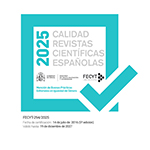La Novelle en la tradición teórica del siglo XIX
Abstract
The 19th century theory of the 'Novelle' comes down to a group of fragmentary and contradictory testimonies from which it is impossible to infer a coherent and final definition of the genre. The author advocates, nevertheless, for the existence of a common element shared by the different theoretical contributions of this period which manifests itself, not in the sense attributed to the generic term, but rather in the way of making use of it. In the main theoretical approaches of the 19th century, the term 'Novelle' designates simultaneously the artistic ideal according to which every author encodes the ultimate goal of the genre and a type closer to the reality of the narrative production of his time. This use of the generic term deprives the classical definitions of all their descriptive function and constitutes the authentic differential element of the 'Novelle' regarding the traditionally named 'historical genres'Downloads
Article download
License
In order to support the global exchange of knowledge, the journal Revista de Filología Alemana is allowing unrestricted access to its content as from its publication in this electronic edition, and as such it is an open-access journal. The originals published in this journal are the property of the Complutense University of Madrid and any reproduction thereof in full or in part must cite the source. All content is distributed under a Creative Commons Attribution 4.0 use and distribution licence (CC BY 4.0). This circumstance must be expressly stated in these terms where necessary. You can view the summary and the complete legal text of the licence.










